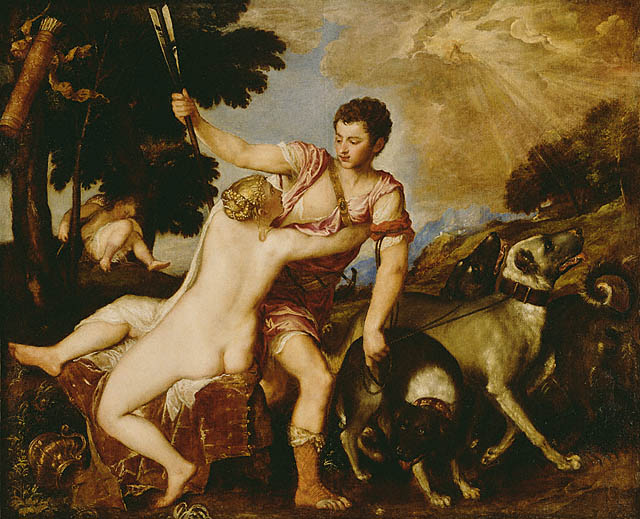There are a lot of things that make Shakespeare's Venus and Adonis great, but one of the best parts of the poem is Venus's nearly pornographic blazon of herself. The blazon is a conceit typically found in Petrarchan poetry in which the poet, a man wooing a beautiful woman, lavishes praise upon the object of desire, singling out each part of her body and turning into some grand metaphor. What makes Shakespeare's poem unique is not only that Venus, a woman, is playing the typically male role of pursuer, but that she uses the blazon to praise not the object of her desire but herself. Venus spends a long time detailing her own body, praising its virtues, but the most powerful part of her blazon comes at line 231:
I'll be a park, and thou shalt be my deer.
Feed where thou wilt, on mountain or in dale;
Graze on my lips, and if those hills be dry,
Stray lower, where the pleasant fountains lie.
(231-234)
Damn, girl. Here, Venus gives Adonis a blazon of herself that is essentially pornographic. She compares her body to a lush landscape on which she implores him to feed. It's pretty hard to miss her meaning.
When I read this stanza, I couldn't help but think of Beyonce's song "Rocket". In the song, which is arguably one of the sexiest on Beyonce's self-titled album, Queen Bey utilizes the same graphic blazon that Venus does. Let's examine some of the lyrics:
And rock right up to the
Side of my mountain
Climb until you reach my peak, babe, the peak, the peak
And reach right into the bottom of my fountain
I wanna play in your deep, baby, deep, baby, deep
(Beyonce, "Rocket", 2014)
Sound familiar? In her song, Beyonce employs the same strategy that Shakespeare's Venus did--the graphic, some might argue pornographic, self-blazon. Both women compare their bodies to lush landscapes on which their lovers can sate themselves. Their curves, their skin, their "fountains" are all part of the beautiful landscape of their body. Both women take the time to appreciate their own bodies in detail, and compare themselves to beauty on a large scale, that of nature. It is also interesting to note that both sets of lyrics compare the female body to mountains and fountains. Aside from the fact that songs and poetry need rhymes, this similarity is intriguing. What is it about the female body that evokes such similar images centuries apart?
Another thing that I love about both "Rocket" and Venus and Adonis is how unabashedly these women celebrate their own bodies. Both Beyonce and Venus take ownership of their bodies and their sexuality. They are not ashamed of their overt sensuality, and instead celebrate it, telling their lovers (or would-be lovers) just how magnificent their bodies are. So magnificent, in fact, that they can only be compared to things of such magnitude as mountains. Though these two blazons come from very different eras, the female empowerment remains the same. I love that these women are confident enough in their own beauty to compel a lover to quench himself on her plentiful body. It seems that the blazon has not and will not go out of style, particularly the self-blazon.
***If you haven't had the chance to watch Beyonce's music video for "Rocket", I recommend you do so immediately. It will change your life. As pertains to this analysis, there is also some great imagery using the curves of Beyonce's body to mimic hills and landscapes that is worth seeing.



.jpg)


